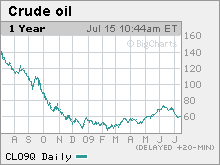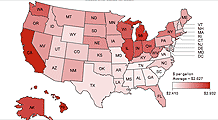Oil pops toward $62
Crude futures edge higher after a government supply report says that inventories fell more than expected.
NEW YORK (Reuters) -- Oil rose more than 4% toward $62 a barrel Wednesday, supported by falling U.S. crude oil inventories and economic optimism following positive U.S. data.
U.S. crude rose $2.02 to settle at $61.54 a barrel Wednesday.
Crude stocks in the world's top oil consumer fell by a greater-than-expected 2.8 million barrels, to 344.5 million barrels, the U.S. Energy Information Administration said.
"The larger-than-expected crude stock draw of 2.8 million barrels is attracting much attention so far in forcing values to fresh highs for the day," said Jim Ritterbusch, president of Ritterbusch & Associates in Galena, Ill.
Support also came as positive economic data spurred investors out of the U.S. dollar and into equities and commodities. The Reuters-Jefferies CRB Index rose more than 1% in early afternoon activity.
The U.S. dollar fell to a one-month low against a basket of six major currencies, while the euro rose 1% on the day versus the greenback.
Global stocks gained after upbeat results from Intel (INTC, Fortune 500), but doubts lingered about the strength of any rebound and the implications for energy demand.
Despite the draw in crude stockpiles, the EIA data showed a build in gasoline stockpiles and a week-on-week decline in the week to July 10, which included the July 4 holiday when the summer driving season typically peaks.
Gasoline stocks climbed 1.5 million barrels last week to 214.6 million barrels, beating analyst forecasts, despite the Fourth of July holiday weekend.
"We should be focusing on gasoline and gasoline inventories increased going into the 4th of July holiday," said Phil Flynn, analyst, PFGBest Research in Chicago.
"Obviously that raises questions about the demand side of the equation, (and) evidence seems to be suggesting that it was not very good," Flynn said.
Weak demand for fuel due to the ailing economy lifted stockpiles of refined products, with distillate stocks reaching a 25-year high last week, according to the EIA data.
Nigeria's main militant group have agreed to a 60-day ceasefire, but traders had yet to be convinced it would translate into a more stable environment for oil production.
Doubts over the sustainability of any truce were amplified after Henry Okah, a Nigerian militant leader released by the government on Monday, told Reuters he believed other militants would keep attacking the country's oil industry. ![]()



